Fyrirlestrar / Lectures
Dick Harrison
The Era of Evil
The Development of Witch Persecutions and Trials in Europe from the Middle Ages to the Eighteenth century
Fimmtudaginn 19. febrúar 2026 kl. 16.30 / Thursday, February 19, 2026, at 16.30
Fyrirlestrasal Eddu (E-103) / Edda auditorium (E-103)
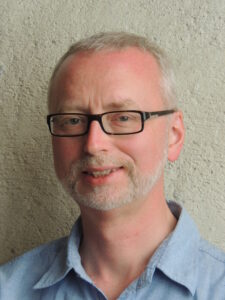
In the early Middle Ages, the Christian church of Europe regarded magic in much the same way that we do today. It was regarded as superstition, as a bundle of ideas that should be combatted not because they could result in real harm, but because they were stupid. Since all power emanated from God, the very notion that Satan or one of his demons could be called upon to render assistance to witches and wizards was nonsense. Hence, witches and wizards were not taken seriously, and they could be (and were) used in stories and plays as elements of entertainment.
However, in the late thirteenth and early fourteenth century, this attitude began to change. In the 1320s, the pope himself acknowledged that magic users should be taken seriously, for the same reason that heretics were to be feared. Since heretics—i.e., Cathars and Valdensians—did exist and, moreover, caused serious harm to Christianity, it was only logical to assume that they were inspired by Satan and the forces of evil. In all probability, these dark powers also tried to exert influence over the world by employing witches and wizards. Accordingly, practitioners of magic were to be dealt with in the same fashion as heretics: by investigations and persecutions and, as a last resort, by burning at the stake.
This was the beginning of a development that created an atmosphere of fear of magic that resulted in sporadic eruptions of witch hunts. Eventually, tens of thousands of innocent Europeans were tried and killed, with a culmination in the seventeenth century. The processes varied considerably: for example, the vast majority of the victims in continental Europe were women, while the majority of the Icelandic victims were men. In present-day Estonia and Latvia, there were few witch trials but many werewolf trials. In Spain, some of the biggest persecutions of the era were launched, but they were quenched by the Inquisition, since this well-trained ecclesiastical court demanded reliable pieces of evidence. In Sweden, on the other hand, many women were condemned to death simply because local children made up stories about their alleged visits to Blåkulla, where they were supposed to have made pacts with the Devil.
How was this possible? Why did learned intellectuals embrace popular ideas that had previously been regarded as ludicrous? And why did the witch craze stop? What made judges, priests and princes realise that the accused were innocent?
Dick Harrison is Professor of History at Lund University in Sweden. He has published more than a hundred books on various historical subjects, with a major focus on the Middle Ages. His book about the Black Death was rewarded the August Prize for best Swedish non-fiction book in 2000, and he was the editor (and a major contributor) to the eight-volume work Sveriges historia (“The History of Sweden”). Harrison appears frequently as an expert in Swedish radio and television.
Fyrirlesturinn verður haldinn á ensku og er öllum opinn. / The talk will be delivered in English and is open to all.
—o—o—o—
Fyrirlestrar / Lectures
Helgi Þorláksson
Klofasteinar fyrir norðan
Geta klofasteinar sagt eitthvað um landnám Íslands og þá hvað helst?
Fimmtudaginn 5. febrúar 2026 kl. 16.30 / Thursday, February 5, 2026, at 16.30
Fyrirlestrasal Eddu (E-103) / Edda auditorium (E-103)
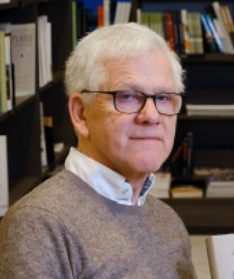
Fyrirlesari birti grein árið 2023 þar sem settar eru fram ábendingar um að stórtækir landnámsmenn á Íslandi muni hafa getað ákveðið hvar mörk skyldu vera milli svæða eða stórra jarða sem þeir námu og útdeildu. Vísbendingar um þetta taldi fyrirlesari vera allstóra, klofna steina, svonefnda klofasteina, á mörkum á Suðurlandi, suðvesturhorni landsins og í Borgarfirði, alls 34 dæmi. Hann rökstuddi að steinarnir hefðu iðulega fengið þetta hlutverk á elstu tíð. Fyrirlesari ber núna saman við 39 klofasteina á mörkum í þremur sýslum nyrðra, Húnavatnssýslu, Skagafjarðarsýslu og Eyjafjarðarsýslu.
Helgi Þorláksson er prófessor emeritus í sagnfræði við Háskóla Íslands. Hann fékkst í kennslu og rannsóknum einkum við Íslands- og Norðurlandasögu frá um 900 til um 1800, svið pólitískrar sögu, félagssögu og hagsögu. Doktorsritgerð hans fjallar um hagsögu Íslands á 13. og 14. öld og náin tengsl við Noreg.
Fyrirlesturinn verður haldinn á íslensku og er öllum opinn. / The talk will be delivered in Icelandic and is open to all.
Málþing / Symposium
Report on Rímur 2026: New Directions in Rímur Research
Málþing á vegum Miðaldastofu Háskóla Íslands — A University of Iceland Centre for Medieval Studies Symposium
Föstudaginn 23. janúar 2026 kl. 14.00-16.30 — Friday, January 23, 2026, at 14.00-16.30
Fyrirlestrasal Eddu (E-103) — Edda auditorium (E-103)
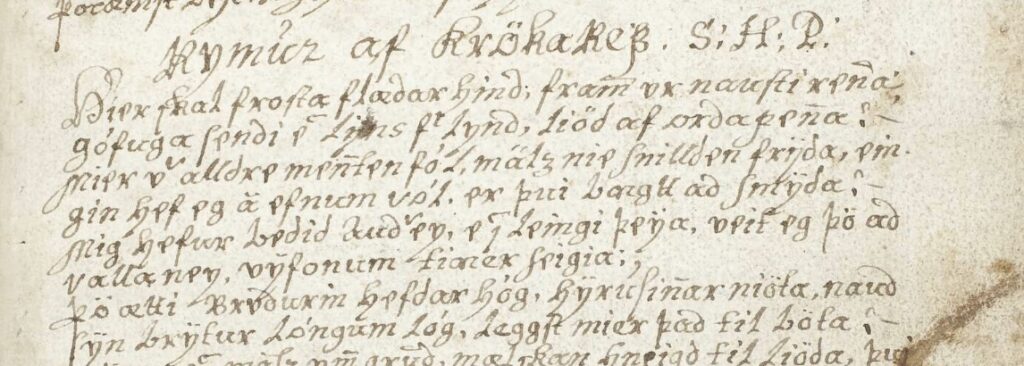
Dagskrá — Programme
- 14.00–14.30 Lena Rohrbach (University of Basel/University of Zürich): Kveða eins og fellur í buccam: Critical Approaches to Rímur in the Eighteenth Century
- 14.30–15.00 Natalie M. Van Deusen (University of Alberta): From Saga to Rímur: The Case of St. Agnes of Rome
- 15.00–15.30 Kaffihlé — Coffee break
- 15.30–16.00 Teresa Dröfn Freysdóttir Njarðvík (Stofnun Árna Magnússonar): The Neverending Story: Kaleidoscopic Narrative Elements and Cultural Memory in Rímur and Rímur-Derived Prose
- 16.00–16.30 Katelin Marit Parsons (University of Iceland/Stofnun Árna Magnússonar): Riches to Rag Paper: Rímur in Manuscript Culture After 1550
Árið 1955 birti Stefán Einarsson greinargerð um rímnakveðskap, „Report on Rímur“, í bandaríska tímaritinu Journal of English and Germanic Philology (JEGP). Aldarfjórðungi síðar sendi Shaun Hughes frá sér greinargerð um helstu rannsóknir á rímnakveðskap síðan 1955: „Report on Rímur 1980“. Áhugi á rímnakveðskap hefur aukist mikið undanfarin ár eins og sjá má á nýjum rannsóknum, útgáfum og þýðingum sem opnað hafa þetta rannsóknasvið fyrir nýjum og fjölbreyttum hópi nemenda og rannsakenda. Í þessari greinargerð um rímur 2026 — „Report on Rímur 2026“ — verður sagt frá nýjum rannsóknum á rímum og rímnahefð frá ýmsum hliðum, svo sem handritageymd, efnismenningu og miðlun.
In 1955, Stefán Einarsson published the first “Report on Rímur” in the Journal of English and Germanic Philology (JEGP). Twenty-five years later came Shaun Hughes’ “Report on Rímur 1980,” which covered developments in the field after 1955. Recent years have seen a resurgence of interest in rímur, with new studies, editions and translations opening up the field to a wider range of students and researchers than ever before. Our “Report on Rímur 2026” showcases recent work on rímur and rímur traditions in their material, medial and academic context. See abstracts below.
Fundarstjóri / Chair: Brynja Þorgeirsdóttir
Kvæðamaður: Þorsteinn Björnsson
Málþingið verður haldið á ensku og er öllum opið. / The symposium will be held in English and is open to all.
Miðaldastofa Háskóla Íslands — The University of Iceland Centre for Medieval Studies
—o—o—o—
Lena Rohrbach
Kveða eins og fellur í buccam
Critical Approaches to Rímur in the Eighteenth Century

The first half of the eighteenth century is the time in which the Arnamagnæan manuscript collection was organized in its final shape following Árni Magnússon’s death in 1730. It is also the period during which the first attempts at histories of Icelandic literature were composed. This paper will approach both these developments with regard to what they reflect about learned approaches to rímur in this first period of Old Norse scholarship.
The placement and categorization of manuscripts containing rímur in the manuscript collection as can be discerned from the first catalogue of the collection by Jón Ólafsson úr Grunnavík and comments on individual manuscripts give insights into conceptualizations of rímur within the overall corpus of texts. The literary histories offer more expansive views of the status and character of this poetic tradition, with considerations of a general kind on the contents, language, metrics, style and (lack of) virtuosity of these poems in relation to both medieval and other contemporary poetic texts, as well as assessments of individual poems.
These early categorizations, definitions and evaluations of rímur both in the organization of the Arnamagnæan archive and in the early literary-historical writings are not only testimonies to the development of Old Norse scholarship at a specific moment in time, but have profoundly influenced and shaped later approaches to this part of Icelandic literary history over the centuries.
Lena Rohrbach is Professor of Scandinavian Studies at the Universities of Basel and Zürich. Her research focuses on late medieval and early modern Icelandic literary traditions in their material and medial context and on premodern critical approaches to this tradition.
—o—o—o—
Natalie M. Van Deusen
From Saga to Rímur
The Case of St. Agnes of Rome

The legend of St. Agnes, the thirteen-year-old Christian virgin who was martyred in Rome in ca. 303–304 CE, survives in three Old Norse prose redactions, all of which are translations of the Pseudo-Ambrosian Passio Agnetis. Agnes was the co-patron of two churches in medieval Iceland, and hers was a Holy Day of Obligation during the country’s Catholic period; her prose legend, like those of the other virgin martyrs, seems to have been especially popular among women in religious orders, for whom the legends of virgins probably had their largest audience. There are also several poetic renderings of the legend of St. Agnes in Iceland, from both the Middle Ages and the Early Modern period. One of these is a rímnaflokkur, Agnesarrímur, composed in the seventeenth century by Rev. Eiríkur Hallsson í Höfða (1614–1698) for his friend’s young daughter, Hólmfríður Benediktsdóttir; the rímur in four fits are extant in only one manuscript (Lbs 705 4to, ca. 1825–34), but are important, both because they represent a larger trend in adapting the stories of saints and other holy women to rímur but also because they likely were the source for the highly popular Agnesarkvæði, allegedly composed ca. 1725 by Þorvaldur Magnússon and extant in over one hundred manuscripts and audio recordings.
This paper provides an overview of Agnesarrímur and its adaptation of Agnes’ vita and passio. It focuses especially on the relationship between Eiríkur’s rímur and the three extant redactions of Agnesar saga. It also considers the other Latin and vernacular works named in the rímur, on which Eiríkur drew when composing his work. The paper considers when, where, and in what form Eiríkur would have had access to these sources, which by extension lends important insight into the availability of Latin texts and works translated from Latin in early modern Iceland. The paper concludes with a consideration of how the sources Eiríkur consulted for his rímur are reflected – or not – in Þorvaldur Magnússon’s Agnesarkvæði, which became the rímur’s greatest measurable legacy.
Natalie M. Van Deusen is a Professor at the University of Alberta. Her area of research specialization is Old Norse and early modern Icelandic paleography and philology, hagiography, and religious literature, with a focus on women, gender, and disability. She has published several books and numerous book chapters and journal articles related to these topics.
—o—o—o—
Teresa Dröfn Freysdóttir Njarðvík
The Neverending Story
Kaleidoscopic Narrative Elements and Cultural Memory in Rímur and Rímur-Derived Prose
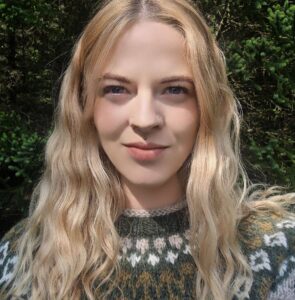
The aim of this paper is to shed light on kaleidoscopic narration within the Icelandic rímur tradition and the rímur-derived prose in post-medieval Icelandic literature. Discussing how kaleidoscopic narration manifests within the tradition and pointing out how it can also be seen as an integral part of the tradition itself. It is an established opinion that rímur are usually based on pre-existing narratives, often already recorded in prose form. Most commonly narratives based in legendary sagas, chivalric sagas, king’s sagas and Íslendingasögur were transformed into a rímur composition. In a few cases no prose narratives are preserved pre-dating the rímur composition, suggesting that they are based on now lost narratives. In later rímur, the tradition is expanded and rímur are composed based on material within oral tradition, eddic poetry or other types of narrative poetic forms.
The rímur form itself suggests a kaleidoscopic narrative element – where a narrative in prose form is recast into a poetic form. However, the narrative within the rímur is not slavishly bound to its prose narrative precursor. The rímur narrative might contain a change of emphasis, additional narrative plots, play on generic traits or boundaries or in other ways makes use of the narrative material at hand in an innovative way. These changes within the rímur tradition have even at times resulted in a new prose redaction of the narrative material – even in cases where older prose narratives are preserved. This suggests a certain fluidity within the literary tradition, where narratives flow freely between literary forms, adapting or adding narrative elements all along the way.
Teresa Dröfn Freysdóttir Njarðvík holds a PhD in Icelandic Literature from the University of Iceland and is currently a researcher at the Árni Magnússon Institute for Icelandic Studies, where she is part of the research project “Riches to Rags: The Popularisation of Rímur Poetry in Post-Medieval Iceland.”
—o—o—o—
Katelin Marit Parsons
Riches to Rag Paper
Rímur in Manuscript Culture After 1550
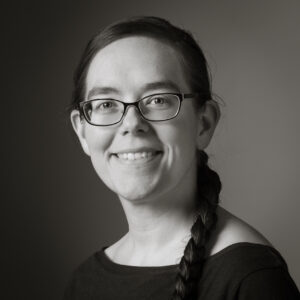
The introduction of rag paper in Icelandic manuscript culture had a transformative impact on poets’ ability to gain access to copies of other poets’ work and to disseminate their own compositions in written form. While premodern rímur are associated with strong performance traditions, late medieval rímur manuscripts seem to have been mainly produced for elite patrons in northwestern Iceland. The publication of the Vísnabók [Book of Verses] at Hólar in 1612 marks a milestone in the development of rímur as a form of popular poetry: for the first time, mass-produced printed books containing rímur became available to households around the island. Prior to this, most Icelanders’ exposure to rímur would have been through encounters with rímur performance.
In my talk, I will introduce the project “Riches to Rags: The Popularisation of Rímur Poetry in Post-medieval Iceland” (Project Leader: Margrét Eggertsdóttir), funded by the Icelandic Research Council (grant no. 2511601-051). Among the project goals is the development of a database of rímur poets active during the period from approximately 1550 to 1725, surviving rímur and associated manuscripts. Building on the extensive work of Finnur Sigmundsson on premodern rímur and rímur poets, we hope to demonstrate the versatility of rímur as a poetic form after 1600 and the increasingly prominent presence of rímur in non-elite manuscript culture.
Katelin Marit Parsons is a co-PI on the project “Riches to Rags: The Popularisation of Rímur Poetry in Post-medieval Iceland” (2025–2028) at the Árni Magnússon Institute for Icelandic Studies and an adjunct lecturer at the University of Iceland. She holds a PhD in Icelandic Literature from the University of Iceland.
Miðaldastofa Háskóla Íslands — The University of Iceland Centre for Medieval Studies
—o—o—o—
Fyrirlestrar / Lectures
Helgi Þorláksson
Klofasteinar fyrir norðan
Geta klofasteinar sagt eitthvað um landnám Íslands og þá hvað helst?
Fimmtudaginn 27. nóvember 2025 kl. 16.30 / Thursday, November 27, 2025, at 16.30
Frestað vegna veikinda; nýr tími auglýstur síðar.
Fyrirlestrasal Eddu (E-103) / Edda auditorium (E-103)

Fyrirlesari birti grein árið 2023 þar sem settar eru fram ábendingar um að stórtækir landnámsmenn á Íslandi muni hafa getað ákveðið hvar mörk skyldu vera milli svæða eða stórra jarða sem þeir námu og útdeildu. Vísbendingar um þetta taldi fyrirlesari vera allstóra, klofna steina, svonefnda klofasteina, á mörkum á Suðurlandi, suðvesturhorni landsins og í Borgarfirði, alls 34 dæmi. Hann rökstuddi að steinarnir hefðu iðulega fengið þetta hlutverk á elstu tíð. Fyrirlesari ber núna saman við 39 klofasteina á mörkum í þremur sýslum nyrðra, Húnavatnssýslu, Skagafjarðarsýslu og Eyjafjarðarsýslu.
Helgi Þorláksson er prófessor emeritus í sagnfræði við Háskóla Íslands. Hann fékkst í kennslu og rannsóknum einkum við Íslands- og Norðurlandasögu frá um 900 til um 1800, svið pólitískrar sögu, félagssögu og hagsögu. Doktorsritgerð hans fjallar um hagsögu Íslands á 13. og 14. öld og náin tengsl við Noreg.
Fyrirlesturinn verður haldinn á íslensku og er öllum opinn. / The talk will be delivered in Icelandic and is open to all.
—o—o—o—
Fyrirlestrar / Lectures
Martin Roček
From String to Meaning
Applying Semantic AI to Find Textual Similarities Between Medieval Dreambooks in Bohemia
Fimmtudaginn 6. nóvember 2025 kl. 16.30 / Thursday, November 6, 2025, at 16.30
Fyrirlestrasal Eddu (E-103) / Edda auditorium (E-103)

This talk discusses the application of a custom-trained Artificial Intelligence model for the semantic analysis of medieval Latin texts, using a corpus of Somniale Danielis (Dreambook of Daniel) manuscripts as a case study. Traditional digital philological tools are often limited to lexical or string-level comparisons, failing to identify passages with similar meaning but different wording. To address this “semantic gap,” I developed “Scribtum,” a workspace powered by a custom Sem-BERT model fine-tuned on a Latin corpus. This model is designed to generate contextual sentence embeddings, allowing for a nuanced comparison of semantic similarity.
The methodology was tested by comparing several medieval manuscripts of the Somniale Danielis. The AI demonstrated high efficacy, correctly identifying 58 out of 59 identical dream interpretations across the manuscripts, a task that is significantly more time-consuming through traditional manual analysis.
However, the study also highlights the inherent limitations of such models, including biases derived from training data and the challenge of distinguishing subtle semantic nuances, which requires further validation. The conclusion is that while AI cannot replace the critical judgment of a researcher, it serves as a powerful and efficient assistant for the initial large-scale analysis of manuscript corpora, accelerating the identification of textual variants and potential filiations.
Martin Roček is a researcher affiliated with both the Institute for Medieval Research (IMAFO) at the Austrian Academy of Sciences and the Faculty of Arts at Charles University, where he received his PhD in 2025. His doctoral dissertation, “Unraveling the Contaminated Tradition: Medieval Dreambooks in Bohemical Manuscripts,” laid the groundwork for his current research. He now focuses on the field of Digital Humanities, specifically investigating how thoughtful design can make digital tools and applications more approachable and effective for academic use.
Fyrirlesturinn verður haldinn á ensku og er öllum opinn. / The talk will be delivered in English and is open to all.
Fyrirlestrar / Lectures
Már Jónsson
Ný útgáfa Grágásar
Fimmtudaginn 30. október 2025 kl. 16.30 / Thursday, October 30, 2025, at 16.30
Fyrirlestrasal Eddu (E-103) / Edda auditorium (E-103)
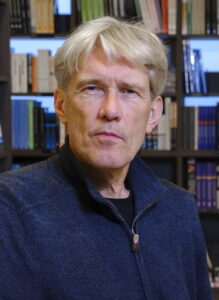
Hið íslenzka fornritafélag áformar að á aldarafmæli þess árið 2028 komi á markað útgáfa á íslenskum lögum miðalda í þremur bindum. Í þriðja bindinu verða Járnsíða, kristinréttur Árna Þorlákssonar og Jónsbók ásamt helstu réttarbótum og fáeinum öðrum skjölum. Grágásarhandritin tvö, Konungsbók (GKS 1154 fol.) og Staðarhólsbók (AM 334 fol.), verða gefin út hvort í sínu bindi ásamt varðveittum skinnbókarbrotum. Útgefendur eru Patricia Pires Boulhosa og Már Jónsson. Í erindinu verður Grágásarútgáfunni lýst og helstu úrlausnarefni reifuð, með hliðsjón af fyrri útgáfum hins mikla lagasafns.
Már Jónsson er prófessor í sagnfræði og sérhæfir sig í útgáfu eldri texta, ekki hvað síst réttarheimilda. Nýjust bóka er Þessi frægu glæpamál. Morðin á Sjöundá og Illugastöðum (2024) í samvinnu við Jón Torfason. Núna vinnur Már að nýrri útgáfu miðaldalaga eins og hann lýsti í greininni „Ný útgáfa íslenskra miðaldalaga,“ Tímarit lögfræðinga 74:4 (2023), bls. 775-813.
Fyrirlesturinn verður haldinn á íslensku og er öllum opinn. / The talk will be delivered in Icelandic and is open to all.
—o—o—o—
